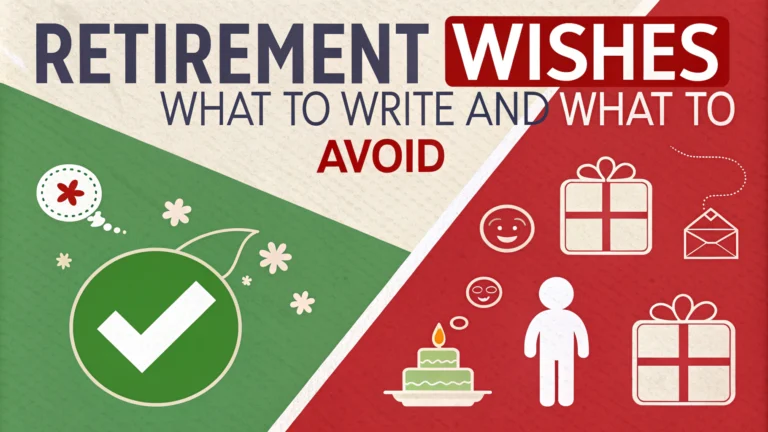Crafting thoughtful retirement wishes requires understanding the right balance between celebrating someone’s career achievements and showing excitement for their next chapter.
Quick Tips for Writing Retirement Messages
- Focus on personal accomplishments
- Share specific memories
- Express genuine gratitude
- Mention future opportunities
- Keep the tone upbeat
Sample Messages for Colleagues
Messages for Friends and Family
What to Avoid
- References to age or getting old
- Jokes about sleeping all day
- Comments about financial situations
- Mentions of health issues
- Focusing too much on the past
Professional Setting Tips
- Keep messages appropriate for workplace sharing
- Include specific contributions to the company
- Mention team impact
- Reference shared professional experiences
Formal vs Casual Tone
| Formal (Boss/Senior) | Casual (Close Colleague) |
|---|---|
| “Your leadership has been invaluable” | “Can’t wait to see your vacation photos!” |
| “Your expertise will be greatly missed” | “Time to dust off those golf clubs!” |
Writing Tips by Relationship
For a Boss: Focus on leadership impact and professional growth they inspired.
For a Colleague: Highlight shared experiences and team contributions.
For a Friend: Include personal memories and future plans.
For Family: Emphasize quality time ahead and proud moments.
Card vs Digital Message Length
- Retirement Card: 2-3 sentences
- Email: 4-5 sentences
- Social Media Post: 1-2 sentences
- Speech: 1-2 minutes
Personalizing Your Message
Consider the retiree’s personality and interests when crafting your message. Reference their hobbies, future plans, or special qualities that made them unique in the workplace.
Key Elements to Include
- Their impact on company culture
- Special skills or expertise
- Future aspirations they’ve shared
- Personal qualities admired by others
Timing Your Message
Send personal messages 1-2 weeks before the retirement date. For public messages or speeches, save them for the retirement celebration.
Group Messages
- Coordinate with other colleagues
- Combine individual memories
- Create a collaborative card or gift
- Plan shared sentiments for public delivery
Conclusion
Writing meaningful retirement wishes is about celebrating both past achievements and future opportunities. Focus on personal connections, specific memories, and genuine good wishes while maintaining appropriate professional boundaries. Whether formal or casual, ensure your message reflects the relationship you’ve shared and the bright future ahead for the retiree.
Final Checklist
- Review for appropriate tone
- Check for personal touches
- Ensure message length suits the medium
- Proofread for accuracy
- Deliver at the right time
FAQs
1. What are appropriate retirement wishes for a professional colleague?
Express gratitude for their contributions, mention their professional impact, and wish them happiness in their next chapter, avoiding overly personal comments or workplace grievances.
2. Is it appropriate to mention money or pension in retirement wishes?
No, it’s best to avoid discussing financial matters in retirement wishes as it can be sensitive and inappropriate. Focus instead on accomplishments and well-wishes.
3. How can I write retirement wishes for a boss or supervisor?
Acknowledge their leadership, mention specific positive impacts they’ve had on the team or organization, and express sincere appreciation for their guidance and mentorship.
4. Should humor be included in retirement wishes?
Light humor is acceptable if you know the recipient well and are certain it will be well-received, but avoid jokes about age, health, or finances.
5. What religious or cultural considerations should I keep in mind when writing retirement wishes?
Keep messages secular unless you’re certain of the recipient’s religious preferences. Respect cultural differences and avoid assumptions about retirement activities or lifestyle.
6. What are appropriate retirement card alternatives for digital communication?
Email messages, e-cards, video messages, or social media posts are acceptable, but ensure they maintain professionalism and respect privacy preferences.
7. How long should retirement wishes be?
Keep messages concise but meaningful, typically 3-5 sentences for written cards or emails. Focus on quality over quantity.
8. What topics should be strictly avoided in retirement wishes?
Avoid mentioning age, health concerns, workplace conflicts, company problems, or any negative aspects of their career or retirement.
9. Is it appropriate to include gift suggestions or money requests in group retirement cards?
No, gift coordination should be handled separately from the card or wishes. Keep messages focused on good wishes and gratitude.
10. What’s the best timing for sending retirement wishes?
Send wishes 1-2 weeks before their last day, allowing time for the message to be received and appreciated while they’re still in the workplace.







